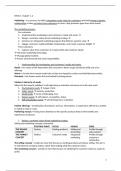Week 1: chapter 1, 2
Marketing = Is a process, by which companies create value for customers and build strong customer
relationships so they get value from customers in return. (Buy products again from their brand)
The marketing process:
For customers
1. Understand the marketplace and customers’ needs and wants
2. Design a customer value driven marketing strategy
3. Construct an integrated marketing program that delivers superior value
4. Engage customers, build profitable relationships, and create customer delight
From customers
5. Capture value from customers to create profits and customer equity
Harnesses marketing technology
Manage global markets
Ensure environmental and social responsibility
1. Understanding the marketplace and customers’ needs and wants:
Needs = Are states of felt deprivation (the consumer's desire to get functional utility out of an
offering)
Wants = Are the form human needs take as they are shaped by culture and individual personality.
Demands = Are human wants that are backed by buying power.
Maslow’s hierarchy of needs
When the first need is satisfied, it will stop being a motivator and move on to the next need
1. Psychological needs hunger, thirst
2. Safety needs security, protection
3. Social needs sense of belonging, love
4. Esteem needs self-esteem, recognition, status
5. Self-actualization needs self-development, realization
Market offerings = Combination of products, services, information, or experience offered to a market
to satisfy a need or want.
Marketing myopia = Paying more attention to the specific products than to the benefits and
experiences produced.
2. Design a customer value driven marketing strategy
Selling and marketing concepts contrasted:
STARTING POINT FOCUS MEANS ENDS
THE SELLING Factory Existing products Selling and Profits through
CONCEPT promoting sales volume
THE MARKET Market Costumer needs Integrated Profits through
CONCEPT marketing costumers
satisfaction
The selling concept = inside-out view that focuses on existing products and heavy selling. The aim is
to sell what the company makes, rather than making what the customer wants.
The marketing concept = outside-in view that focuses on satisfying the customer needs as a path to
profit.
1
,Value proposition = set of benefits or values as promises from the brand to deliver to costumers to
satisfy their needs.
Societal marketing / sustainable marketing = The company’s marketing decisions should consider
consumers’ wants, the company’s requirements, consumers’ long-run interests, and society’s long-
run interests.
For designing a customer value driven marketing strategy you use the four P’s as tools.
Marketing Mix = comprised of a set of tools known as the four P’s:
- Product variety, quality, design, features, brand name, packaging, services
- Price list price, discounts, allowances, payment period, credit terms
- Promotion advertising, personal selling, sales promotion, public relations,
direct and digital
- Place channels, coverage, locations, inventory, transportation, logistics
Integrated marketing program = a comprehensive plan that communicates and delivers intended
value
‘’ The marketing mix consists of a tactical marketing tools blended into an integrated marketing
program that actually engages target customers and delivers the intended costumer value. ’’
Week 2 , Chapter 5
The external environment of an organisations consist of:
- Specific environment:
o Stakeholders: buyers, suppliers. competitors, media. Government, unions
Stakeholders and the organisation have mutual influence on each other
- General environment:
o External factors: political, economic, social, tech factors
Influence the organisations, but the organisations cannot influence the factors
PESTEL is a tool to analyses these factors
B2C Business to Consumer
- Consumer buyer behaviour = Buying behaviour of final consumers. What, Where, How much and
Why they buy
- Consumer markets = Individuals and households that acquire goods and services for personal use
(Coca-Cola sells through AH)
B2B business to Business
- Business buyer behaviour = Buying behaviour of organisations that use these goods for their
own products. Which they sale again.
- Business markets = Looks like consumer markets. The main differences are in market structure
and demand, the nature of the buying unit, the types of decisions, the decision process involved.
(Sugar business sells to Coca-Cola to make Coca-Cola)
2
, 1. Understand the marketplace, how?
Marketers try to find out what the consumer want but they often have too much data:
Big data = huge, and complex data sets
Marketers don’t need more information, they need better information and how to use
this
They develop their information using:
- Internal databases = Electronic collections of consumer and market information obtained from
data sources within the company’s network. Like:
o (information on customer characteristics, sales transactions, website visits, records of
sales, costs, and cash flows, reports, point-of-sale transaction data)
- Competitive marketing intelligence = the systematic collection and analysis of publicly
available information about consumers, competitors, and developments in the marketing
environment.
The goal is to improve the strategic decision making by understanding the consumer environment:
o (Observing consumers firsthand, quizzing the company’s own employees, researching
the internet, monitoring internet buzz)
But it is also used to monitor competitors actions:
o (People inside the company, suppliers, resellers, and key customers, monitoring
competitors’ websites, internet searches, trends, tracking consumer conversations)
- Marketing research = Is the systematic design, collection, analysis, and reporting of data
relevant to a specific marketing situation facing an organization.
Involves more focused studies
It is used too:
o gain insights into customer motivations, purchase behavior, and satisfaction
o assess market potential and market share
o measure the effectiveness of pricing, product, distribution, and promotion activities
Factors affecting consumer behaviour:
- Cultural:
o Culture = Sets of basic values, perceptions, wants, and behaviors learned by a member
of society from family and other important institutions.
o Subculture
o Social class = Society’s relatively permanent and ordered divisions whose members
share similar values, interests, and behaviors
Measured of occupation, income, education, wealth
Marketers are always trying to spot cultural shifts
- Social:
o Groups and social networks
Reference groups, Opinion leaders, Word-of-mouth influence, Influencer
marketing, Online social networks
o Family (the most important)
o Roles and status
- Personal:
o Age and life cycle
o Occupation
o Economic situation
3





